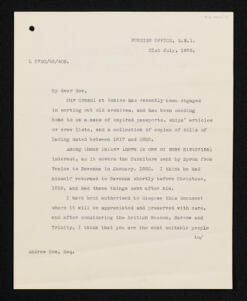Identity area
Reference code
Title
Date(s)
- 21 July 1932 (Creation)
Level of description
Extent and medium
2 single sheets
Context area
Name of creator
Repository
Archival history
Immediate source of acquisition or transfer
Content and structure area
Scope and content
Foreign Office, S.W.1.—Presents to Trinity College a bill of lading for the shipping of Lord Byron’s furniture, discovered among the archives of the British Consul at Venice.
—————
Transcript
FOREIGN OFFICE, S.W.1.
21st July, 1932.
L 3720/43/402.
My dear Gow,
Our Consul at Venice has recently been engaged in sorting out old archives, and has been sending home to us a mass of expired passports, ships’ articles or crew lists, and a collection of copies of Bills of Lading dated between 1817 and 1823.
Among these latter there is one of some historical interest, as it covers the furniture sent by Byron from Venice to Ravenna in January, 1820. I think he had himself returned to Ravenna shortly before Christmas, 1819, and had these things sent after him.
I have been authorised to dispose this document where it will be appreciated and preserved with care, and after considering the British Museum, Harrow and Trinity, I think that you are the most suitable people to {1} have it, if you want it.
I enclose a translation of it so that you may see its nature {3}. I think the last item the “small child’s bed” is rather pathetic as it doubtless belonged to little Allegra, who had been ill just before they left Venice.
I do not know whether you will find it necessary to consult anybody else before accepting this offer. I presume your Council does not meet in the long vacation, nor your Library Committee, but you can doubtless speak to the Master or Vice-Master about it, and if you tell me that you would like it, I will send it by registered post or bring it with me some week-end when I come to Cambridge.
Yours ever,
Stephen Gaselee
Andrew Gow, Esq. {2}
I feel that if it went to Harrow it might set the boys asking “But why did the poet go from Venice to Ravenna?”
—————
Typed, except the signature and the postscript.
{1} Typed as a catchword at the foot of the first page and repeated at the beginning of the next.
{2} Typed at the foot of the first page.
{3} It is unclear whether the translation accompanied the bill from Venice, or whether it was made in England by Gaselee himself or someone else.
Appraisal, destruction and scheduling
Accruals
System of arrangement
Conditions of access and use area
Conditions governing access
Conditions governing reproduction
Language of material
Script of material
Language and script notes
Physical characteristics and technical requirements
Finding aids
Allied materials area
Existence and location of originals
Existence and location of copies
Related units of description
Sent with R.2.40A/13–15.

